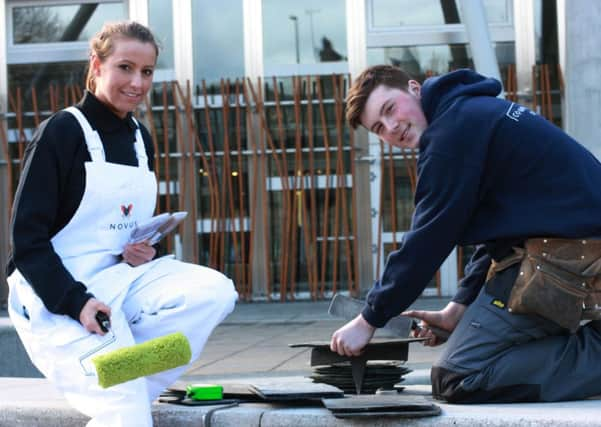Back to the future for the next Scottish craftsmen


OUR urban areas are becoming increasingly modernised and, arguably, homogenised, with one gleaming, glass-fronted pile often much the same as the next. That’s not to say that modern buildings aren’t attractive, but it is important that we preserve our heritage buildings properly, making sure we don’t lose the grandeur they possess. To do this, we need to make sure the country has enough people with the specialist skills and expertise to repair and maintain them.
Traditional construction and building skills – in which Edinburgh College offers a comprehensive range of training, including roof slating, stonemasonry, conservation and restoration training in plasterwork and paintwork – are crucial. We have been trying to reinforce this to politicians, to make sure we’re in a position to continue providing this training.
Advertisement
Hide AdAdvertisement
Hide AdRecently, some of our student apprentices visited the Scottish Parliament with our partners Construction Scotland and Historic Scotland to demonstrate their traditional skills to politicians, highlighting that, just because the skills they’re learning have been around for a long time, that they’re by no means irrelevant in the modern world.
If we value our heritage and want to preserve it for future generations, we need the skills. Apprenticeships in areas such as these are vital to the construction industry and in helping boost the national economy. In the initial recommendations from his independent Commission for Developing Scotland’s Young Workforce, Sir Ian Wood recommended placing increasing emphasis on vocational training and apprentices. We hope his words are heard and that the government and national firms look to apprenticeships as a great way of providing employment opportunities and helping businesses grow.
As well as educating students to protect the historic structures of the past, the college has a thriving construction skills department, delivering a range of courses for people to meet modern construction’s low-carbon agenda of the future.
It is important that we continue exploring the best ways to deliver training in these areas. Even when we are focusing on traditional building skills, we should embrace the latest emerging technologies if they can better equip students for the world of work in both traditional and future craft trades.
One example of this is our work with Heriot-Watt University in developing mixed reality and motion tracking technology that allows construction students to experience realistic site conditions in a safe environment. The Immersive and Controlled Environment (ICE) Lab at Edinburgh College, which is funded by the Construction Industry Training Board (CITB) Scotland – uses technology developed at Heriot-Watt to simulate construction scenarios such as being hundreds of feet up in the air. These simulated experiences help prepare students for actual working environments, meaning they are less likely to be daunted when they’re doing it for real.
The project also involves wearable motion tracking technology that supports the provision of quantitative feedback on how they are working to help improve technique and avoid bad practices. For example, this will enhance health and safety practice by ensuring our students are adhering to professional standards before they step into a real working environment. We’re trialling the technology at the moment and we hope eventually to use it in our construction curriculum.
This is a real innovation in how we use traditional building skills, but it’s also important that we invest in the basics, ensuring our provision for students and apprentices is complementary and comprehensive. At Edinburgh College, we’ve recently upgraded our workshops to provide more realistic working areas. Not only does this allow us to meet the needs of the construction industry more effectively, but it ensures our students have an enjoyable, fulfilling learning experience.
We run a Traditional Heritage Initiative with several council partners including Midlothian Council’s Dalkeith and Gorebridge Heritage Initiative and Borders Council’s Kelso Heritage Initiative. This allows us to develop and deliver short courses within the college that support the sustainable traditional skills agenda. We engage with employers, home owners and schools within the council regeneration areas, giving people an awareness and understanding of the traditional building skills required to build and maintain historic structures.
Advertisement
Hide AdAdvertisement
Hide AdCandidates are offered the opportunity to complete experiential learning tasks to see if a career in traditional building skills would be suitable for them. This ensures the sector recruits passionate people who want to be involved and learn, and eventually pass these skills to others.
Ultimately, apprenticeships in traditional building skills can lead to satisfying careers with excellent opportunities, can help build up local businesses and support the economy, and will preserve the nation’s historical legacy. Traditional skills are vital, exciting areas that can allow our young people and our country to thrive.
• John Laing is head of the Institute of Construction and Building Crafts at Edinburgh College www.edinburghcollege.ac.uk
SEE ALSO